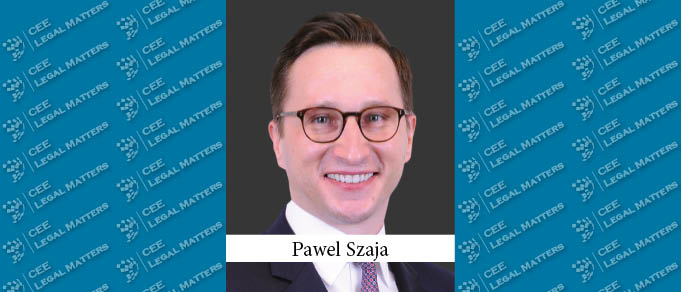Interview with Pawel Szaja of Shearman & Sterling.
CEELM: Run us through your background, and how you ended up in your current role with Shearman & Sterling in the UK.
Pawel: I was born and raised in Chelm, a small town in East Poland, 25 kilometers from the Ukrainian border, where I went to high school. I moved to study German Literature and Law at the Warsaw University, and I graduated in 2005. During my university time I spent three years in exchange programs at the Goethe University in Frankfurt, the Freie University in Berlin, Universite de Geneve in Switzerland, and Universite de Paris II in France. In 2004 I went on a three-month secondment to the legal department at Deutsche Bank in Frankfurt where I came across Capital Markets, International M&A, and ABS Financing Structures for the first time. I thought it was quite interesting and worth focusing my career on. What followed was a Masters in Law & Finance from the Institute for Law and Finance in Frankfurt in 2006 and an LL.M. from Columbia Law School in 2008, allowing me to pursue this plan and a career in Capital Markets. I took the NY bar after my LL.M., started in Capital Markets at Davis Polk in New York in 2008 and moved to London in 2009 because of my family. I continued at Davis Polk in London, went on secondment to the ECM execution team at Credit Suisse London in 2014 and switched to Shearman & Sterling at the end of that year. I made Partner at Shearman & Sterling in January 2018.
CEELM: Was it always your goal to work outside of Poland?
Pawel: I would not say that it was my goal from the beginning. As with everything in life, it is a function of circumstances, luck (stars need to align!), and personal decisions. I did want to study abroad, which I did through exchange programs, and which helped me decide about my professional career.
CEELM: Tell us briefly about your practice, and how you built it up over the years.
Pawel: Since making Partner at Shearman & Sterling in January 2018 I have covered Emerging Markets and DACH (Germany, Austria, and Switzerland). Although equity and debt capital markets is my core practice, I have also done quite a lot of M&A and bank finance work in the region. Prior to COVID I would travel quite a lot to build and maintain contacts in the region. Right now it all happens online.
CEELM: How would clients describe your style?
Pawel: I like to think that I know how people think in the Emerging Markets and what drives them. I try to use my background and language skills as my assets and am quite conscious of cultural sensitivities. I view is this as key to being a successful emerging markets lawyer.
CEELM: There are obviously many differences between the Polish and English judicial systems and legal markets. What idiosyncrasies or differences stand out the most?
Pawel: While I was educated in Poland and other European civil law countries, I am only admitted to practice in certain common law countries. The general principle of law – either what is not prohibited is allowed or, alternatively, only what is explicitly enumerated is allowed – causes the main differences and often-times interesting discussions among lawyers. On the other hand, the importance of English law, in particular in Emerging Markets, is significant, and it often results in changes to how local lawyers perceive certain aspects. Seeing in person how the law and application of law changes is the exciting part of my job.
CEELM: How about the cultures? What differences strike you as most resonant and significant?
Pawel: Looking at Europe’s Emerging Markets in particular, the history in the past 30 years is definitely critical to the understanding of how people in those countries think and act. Some of the most important decisions in living history (such as the fall of communism, accession to the European Union, NATO, and various global crises) have happened during this time. My personal view is that the countries are still catching up with Western Europe, not only economically but also from a cultural and social perspective, but the youngest generation of people – such as, for example, my Polish cousins in high school – view themselves as European citizens first, and I do not really see many differences between them and, for example, British teenagers. This is a major change compared to my generation or the generation of my parents.
CEELM: What particular value do you think a senior expatriate lawyer in your role adds – both to a firm and to its clients?
Pawel: It is the understanding of the culture and language skills that in my opinion make the difference. It happens quite often in this part of the world that transactions are executed solely in a local or regional language and having someone from London who can pick up the phone and just make the discussion easier for the client means a lot.
CEELM: Do you have any plans to move back to Poland?
Pawel: I do not exclude it as an option in 10/15 years although other countries, such as Spain or Portugal, are equally strong candidates!
CEELM: Outside of Poland, which CEE country do you enjoy visiting the most, and why?
Pawel: Recently I have been spending quite some time in Turkey and started reading more about their culture and history. It is a fascinating country, with great history and, more importantly, some of the best food in the world!
CEELM: What’s your favorite place to take visitors in London?
Pawel: A little-known family-run Italian trattoria in Chelsea, Tate Modern, and Richmond Park (deers!).
This Article was originally published in Issue 7.10 of the CEE Legal Matters Magazine. If you would like to receive a hard copy of the magazine, you can subscribe here.

















